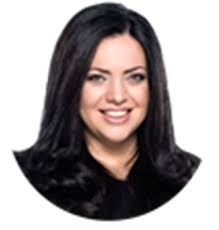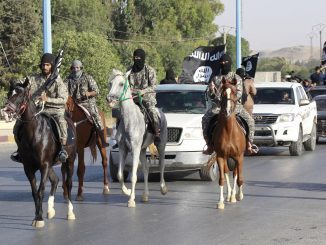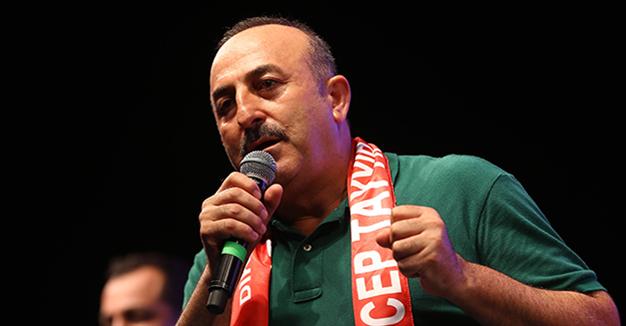
BY: Merve Şebnem Oruç*
Former Mosul governor and al-Hashd al-Watani commander, or “Guard of Nineveh” as he is now known, Atheel al-Nujaifi, had recently stressed that he wanted the Operation Euphrates Shield model to be applied on Mosul as well. This was a valid request, because based on past and regional experiences, if Daesh was to be rid of, the Sunnis who make up the majority of the city’s population, should be an indispensable part of this operation. However, the Bashiqa crisis that recently surfaced between Baghdad and Ankara and the U.S.’s now funny attitude shows that there is a different intention.
There is no need to beat around the bush. Even if we try to avoid getting sects involved in the matter when explaining the issue in Turkey, the situation in Iraq is a sectarian issue. In fact, this is not a conflict that solely has historical and regional roots. It is being accelerated and intensified through catalysts like Daesh by the hand of Iran and the U.S. Every conversation in Irbil, like in the north of Syria leads to one point: Will Mosul be the Sunnis or Shiites? Will Mosul be run by the people of Mosul or by the U.S. and Iran? Because who Mosul will belong to will directly affect the future of Sulaymaniyah, Kirkuk, Irbil, in other words, the future of Northern Iraq.
In order to understand the U.S.’s game plan, the PKK corridor it is trying to build along the Sinjar-Tal Afar-Khabur line should not be missed. The critical developments here are important in that they indicate the Americans are prioritizing the peshmerga as a Kurdish actor in Iraq only temporarily and if the plan succeeds, in the future, the existing Kurdish political conflicts within Iraq will turn to physical clashes. In other words, if the American game works, time will come when the peshmerga will separate and peshmerga forces loyal to Barzani will get into a bloody civil war with the PKK and its supporters for the north of Iraq.
The way the Mosul operation will take place is roughly obvious. The city will be sieged in three fronts and there will be an intense flow of the population leaving from the corridor to be opened for the civilians – and inevitably, Daesh elements will also blend among this crowd. The Turkish border is going to be directly exposed to a new influx of refugees and hence the threat of Daesh elements that have snuck in among them. Hence, a wrong operation is going to start a new chain of disasters with the domino effect it will create. Also, the region’s demographics is going to be tampered in a bloody way under the name of fighting Daesh.
Yet, a plan similar to the construction of a safe zone along the Azaz-Jarablus line where Turkey launched an operation in the north of Syria should also be implemented in Iraq. Sunni elements should take place in the Mosul operation and the Daesh elements to sneak in among the civilians should be eliminated this way. However, the U.S. is in no way opening up to this idea. In fact it gets incredibly disturbed about it being expressed. Instead, it is trying to include the PKK in the game in a way that it will cause a Kurdish civil war in Northern Iraq one day or another – it is trying to position the more than 40-strong Shiite militia group within al-Hashd al-Shaabi, like the Badr Organization, which Daesh would seem an amateur in violence in comparison, as the lead actor of the Mosul operation. These killers who hang Sunnis from their bodies in city centers and pour petrol over them and burn them for all to see, are today given Iraq military uniforms and made a legitimate part of the operation. Also, the Iranian effect on al-Hashd al-Shaabi and Iranian Revolutionary Guard Corps commander Qasem Soleimani being in a position to give direct orders to these groups, shows that the other official behind the proxies is Iran.
There is a very common discourse, “We are not only fighting Daesh but also the Daesh mentality.” Unfortunately this is where the biggest trap lies. Because the fight plan is not limited to Daesh’s takfiri and kharijite mentality. The PKK that has been turned in to a pop icon, calling it a “secular force,” the Shiite militias that have proudly and openly turned their hostility toward Sunnis into an open discourse, do not hesitate from saying that it is not the Daesh mentality that is on the target board but Sunni Islam. The slogans filled with a series of dreams aimed at the south, at Mecca and the north, at Turkey after Iraq and Syria, reveal the long-term plans of these two organizations hiding behind the “fight against Daesh” shield and their supporters.
This is why President Recep Tayyip Erdoğan stressing the importance of Mosul’s future, that a wrong step will not be tolerated and that Turkey is going to be at the table despite all pressures, is being manipulatively reported by so-called very professional and unbiased news agencies such as Reuters with photographs of a group of Shiites burning Erdoğan posters in Basra – whatever the connection. The message they are trying to give to the world is that the people of Iraq are against Erdoğan. This is how the truths are being reversed and this is how maps and demographics are being changed.
I may have failed at the propaganda war and failed to tell the world the truths, but this is no longer important, because now is the time to take action. We need to take things into hand in Iraq now like we did in Syria, because the issue also concerns our future.
*Merve Şebnem Oruç is a Turkish journalist and columnist.
(Published in Yeni Şafak Turkish newspaper on Sunday, Oct. 16, 2016)


